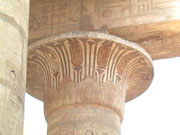INFORMATION FOR TRAVELLERS TO
GREECE
GREECE
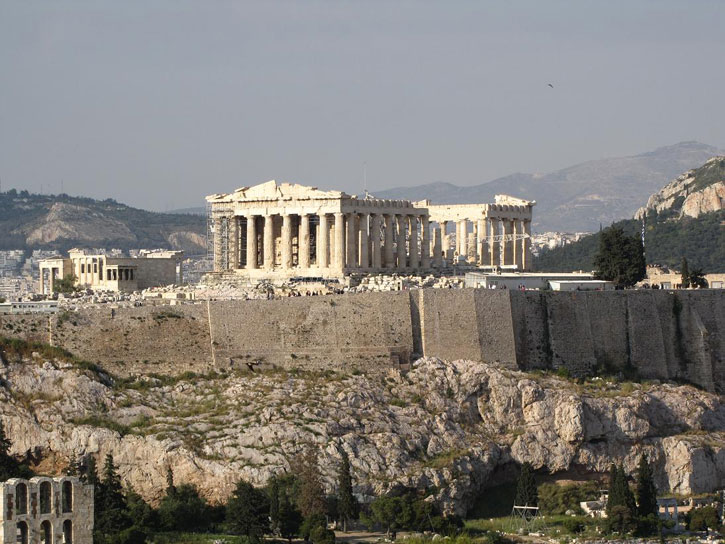 |
Welcome to 'B.C. Archaeology', the Australian tour company specialising in travel to ancient world destinations. We currently take tours to Egypt, the Sudan, Turkey, Greece, Sicily and Malta, Spain, Morocco, and Tunisia. This year we are also taking tours to Burma and Cambodia. In the future we intend to expand into ancient meso-America (Mexico, Guatemala and Belize) and also South America (Peru). The following information is provided to assist you in selecting and preparing for your holiday. The details are provided only as a general guide to help you prepare for your tour.
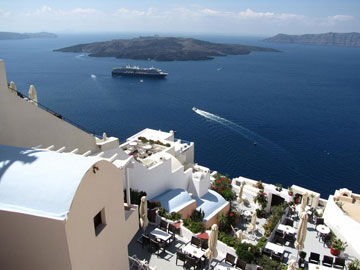 |
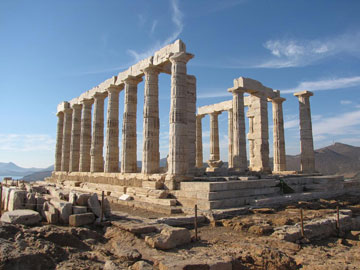 |
Santorini - superb |
The Temple of Poseidon on Cape Sounion |
ACCOMMODATION
We select our hotels with care and in most cases the hotel has been used by a member of our staff. We look for high standards of comfort and charm, and like a welcoming atmosphere. An important consideration is location - we have a strong preference for small, quiet hotels in the historic centre of a city, preferably within walking distance of local caf�s and restaurants. These are often family run hotels or pensions which have friendly and helpful local staff. Hotel managers and most staff will speak some English.
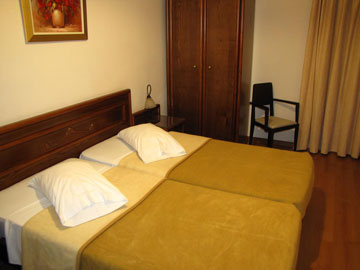 |
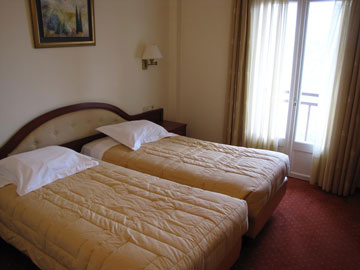 |
Hotel Hermes in Athens |
Hotel Arion in Delphi |
We mainly stay in quality 3-star hotels, although we do sometimes include 4-star accommodation in our programs. The star-ratings are those quoted by the relevant national or regional authority. We expect that each room will be clean and well maintained - most rooms will have air-conditioning or fans, a television and a refrigerator. WE ONLY USE HOTELS WHICH HAVE EN SUITE WESTERN-STYLE PRIVATE BATHROOMS WITH TOILET AND SHOWER/BATH.
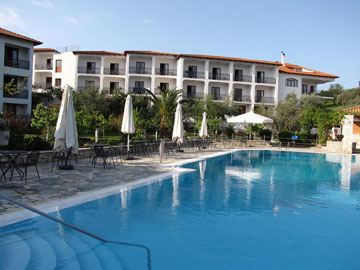 |
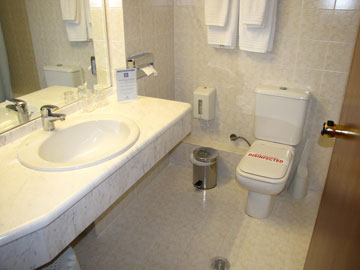 |
Hotel Europa in Olympia |
Hotel Europa in Olympia |
The price of each tour is based on twin-share accommodation although a single supplement can be pre-arranged (see Single Supplement below). Double beds can often be arranged for couples but please be aware that they may not always be available. Accommodation is on a �Bed and Breakfast� basis with breakfast served in the hotel dining room. The food that is provided will vary from hotel to hotel but the breakfast is usually �Continental Style� - a danish or croissant with coffee or tea (see Food below).
CLIMATE
Greece lies in the central Mediterranean, which means that it is generally hot and dry in the summer (June-August), warm and sunny in autumn (September-October), cool and slightly wet in the winter (November-February) and cool and sunny in spring (March-May). In Greece most rain falls between December and February with January often being wet. The following data should give you some idea of the type of weather that is found in the areas we visit:
| January | April | July | Sept | |
| Athens | 6-13�C | 10-20�C | 21-32�C | 8-29�C |
| 62mm | 23mm | 6mm | 15mm | |
| Crete | 8-15�C | 12-20�C | 22-29�C | 20-28�C |
| 17mm | 11mm | 0mm | 3mm |
CLOTHING
Light cotton clothing is best for travelling. Take plenty of T-shirts and light trousers. When packing, remember that in the period we are travelling you will not normally need winter clothes such as heavy jackets but you should bring a jumper and a light jacket. LAYERS OF CLOTHING ARE USEFUL so that you can adjust to the increasing temperature during the day. It will generally be cool in the morning, warm to hot during the day, and warm to cool at night. It is best to pack light since you can always buy T-shirts and other clothing locally.
FLAT, COMFORTABLE WALKING SHOES like sandshoes or trainers are the most appropriate foot wear for day-to-day wear. You might also like to bring some smart casual clothes for going out in the evenings.
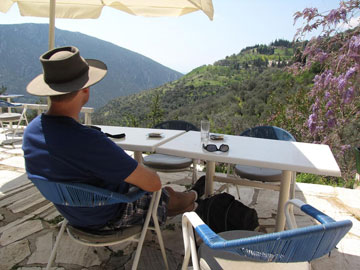 |
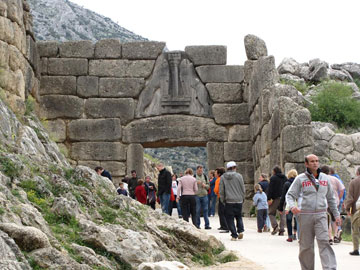 |
A break in Delphi |
Light jumpers and jackets useful |
Please note that a clothes washing service is NOT normally provided in the smaller Greek hotels. If you want to have your washing done for you then you will need to find a local laundrette (Plindiria)- this may either charge per item or give you a fixed price per load, and may provide either an overnight service or take two or three days. This will cost about 8-10 euro per load. You may wish to buy washing powder (or bring your own) to wash small items of clothing in your hotel room. Make sure you bring a �universal plug� for the sink - some Greek hotels may not provide plugs or they may simply have gone missing. You might also like to bring a light washing line which can be strung up in the bathroom, or on the balcony, and some clothes pegs.
Sunburn is a problem for travellers and can be avoided by wearing a hat with a broad brim and applying plenty of sun cream. Wear long sleeved shirts in preference to short sleeved ones if you have sensitive skin. It is advised that you ALWAYS WEAR A PAIR OF SUNGLASSES when we visit archaeological sites - the sun can be very bright and there is a great deal of reflected light from the rocky surfaces.
COMMUNICATIONS
Greece has a well developed tourist industry and it is easy to acquire postcards and stamps from kiosks, shops and news stands. Post offices in the main cities are open long hours. You can also acquire postcards and stamps at museums and tourist sites.
The telephone service is good - there are numerous communications businesses which offer international calls and most of the hotels we stay in also offer this service. You can often use the phones in the hotel but be aware that they will include a surcharge. If your mobile phone has global roaming you can use it throughout Greece. The international code for Greece is 30 and the access code for making international calls while in Greece is 00.
The internet is widely available in Greece, and many hotels and businesses have e-mail facilities. There are numerous internet caf�s - experience has shown the service to be relatively cheap and reliable. They normally charge 2-4 euro per hour. Wireless services are often available in hotels.
ELECTRICITY
The electricity in Greece is 220 volts. In Greece the plugs are of the two-pronged European type with round section. Make sure you have an adapter before you arrive.
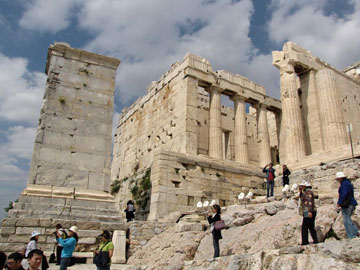 |
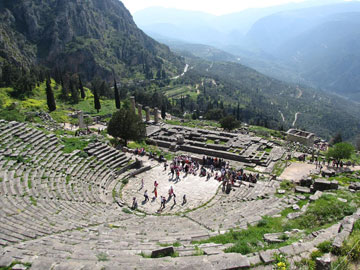 |
Climbing the Akropolis |
Exploring Delphi |
FILM AND CAMERAS
Film is widely available in the tourist areas and is generally reasonably priced, but you will probably get your film cheaper at home and it is thus worthwhile taking enough to last the whole trip. It may be difficult to find slide film everywhere. It is possible to get your photographs printed relatively cheaply but it may be better to wait until you get home if you have doubts about the quality.
Digital photography is widespread in tourist areas in Greece and it is relatively simple to find places where digital photographs can be burnt onto CD�s. It is much easier and less of a hassle to take a number of flashcards (memory sticks) which can be downloaded when you get home, or you can take a laptop, a MP3 or similar storage device onto which you can download your photos.
In Greece there are no restrictions about photography in museums - you will be able to use a camera in museums, and generally will not be able to use a flash (it is therefore worth taking high ASA/ISO film if you think you will take photos of artefacts in the museums, or adjust your camera to low light conditions).
FITNESS
Participants should have good general fitness as most days include at least some walking - the amount of walking varies from day to day. The �B. C. Archaeology� programs are designed to be �Study Tours� and as a result we tend to spend longer than the usual tour program exploring the historical sites and museums. During our walking tours in Athens we may be walking for up to 6-8 hours around the ancient part of the city - numerous opportunities are provided for a rest.
Buses are not always able to arrive directly at the archaeological sites we are visiting and thus a short walk may also be required to get from the car park to the site. Access to some sites involves climbing up and down stairs, or walking across rough or uneven ground. Those with mobility problems need to consider carefully whether they are capable of such activity.
We often take short breaks, when we rest and sit down to discuss the significance of what we have been looking at. We also try to provide plenty of time in the program for rest and relaxation.
FOOD
The �B.C Archaeology� tours operate on a �Bed and Breakfast� basis i.e. they generally only include breakfast at the hotel. This usually consists of a basic continental style breakfast; generally a Danish or croissant with tea or coffee and orange juice. Some hotels will provide a more elaborate buffet style breakfast with toast and cereal but this is not common.
We select hotels which are close to a range of reasonably priced restaurants and eating places where we can sample a range of traditional local Greek meals. Where possible we stop during the day for a light lunch or snack in a local caf�. If a site is not close to a caf�, a picnic lunch might be organised in advance (tour participants may need to buy some food the night before and share or we can make a quick purchase en route).
Greek food is relatively well known and is always made from fresh ingredients. There are a range of pre-cooked options for lunch in small restaurants (called estiatorio) which include moussaka (eggplant and pastry), macaroni pie, tyropitakia or spanakopites (cheese and spinach pies) meat stews, stuffed peppers, vegetable casseroles and oven baked fish. Larger restaurants or tavernas come in a range of sizes.
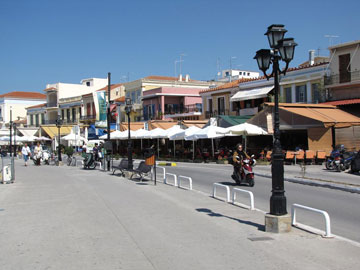 |
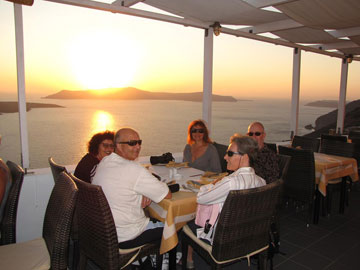 |
Restaurants on Aegina |
A cafe on Santorini |
Frequently a meal will start with mezedhes and salads which can be shared. Common mezedhes include tzatziki (yoghurt and cucumber dip), melitzanosalata (eggplant dip), fired zucchini or haricot beans. Main courses may include souvlaki (meat cooked on a spit), pork spare ribs, roast lamb, keftedhes (breadcrumbed meatballs) and spicy sausages. Stewed or baked goat is worth trying. Greece is famous for its fish and seafood - popular dishes include sardines, mackerel, bream, baby squid, and octopus. Fish is often purchased by the kilo. Desserts include baklava (filo pastry with nuts and sugar syrup), kataifi (honey drenched shredded wheat), loukoumadhes (deep fried batter with cinnamon), gelakto-boureko (custard pie), and rice pudding. All eateries offer wine - the house wine is often excellent. Greeks eat late (lunch at 2-3.30 pm and dinner from 9-11 pm).
Cafes (kafenia) are a large part of the Greek culture. The standard type of coffee is �Greek� style (never call it Turkish!!) which comes unsweetened, medium or very sweet. Some cafes, particularly in the larger centres, can make Italian style cappuccinos, espressos or filter coffee, but this is not always available. Nescafe has become the generic term for instant coffee - it is vile and should be avoided at all costs! Kafes frappe or iced instant coffee has become very popular and is often made with condensed milk. Stand at the coffee bar for a cheap coffee or pay a little more to sit at a table and watch the locals at work and play.
Travellers often avoid salads while travelling but this is not really necessary in Greece, where food hygiene is generally good. Food that has recently been prepared or cooked is less likely to make you ill; avoid eating food, particularly meat dishes, which may have been kept warm for long periods. Fruit that can be peeled is best.
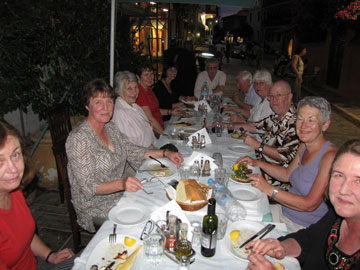 |
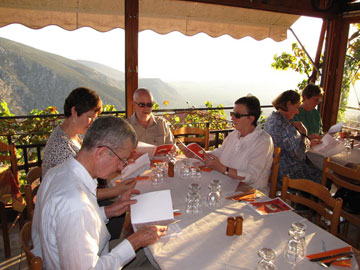 |
Dinner in Nauplion |
Dinner in Delphi |
You might like to bring some snacks with you, such as muesli bars, if you require a regular sugar fix at 11am, although we are rarely far from a caf�. For lunch we normally stop at a small caf� and have a sandwich, spanakopite, pasta, pizza or salad. This should cost about $15-20. The evening meal is usually more substantial and we normally visit a restaurant. This meal may be more expensive and can vary from $20-50 dollars per person depending on what you eat. Greece offers a wide range of eateries from inexpensive cafes to five star silver service restaurants in luxurious surroundings. The choice is up to you!
FREE TIME
All tours include some free time; this varies depending on the tour program. Generally we try to see as much as possible during our stay and we will often be away from the hotel between 8am and 5pm including travel time. The itinerary usually includes a free morning or afternoon every couple of days which can be used to rest or explore the local area. We also try to include at least one free day in the middle of the program as a total break. Evenings are usually free to relax, wander in the shopping districts (a short walk from our hotel) or socialise with other members of the group.
HEALTH
Most frequently used medicines, such as Paracetamol are widely available over the counter. Chemist shops are common but it would be advisable to take some medicines for daily use such as pain killers, throat lozenges and plasters. If you have a special medical condition, it is recommended that you take enough of your medication to last you the length of the trip. Please advise the tour leader about any medical conditions which may affect your ability to travel (such as diabetes). Women may wish to bring their preferred feminine hygiene products as these may not be commonly available.
An upset stomach is a common complaint amongst tourists and normally passes in a day or two - it is mainly caused by the change in food and water and exposure to different bacteria and possibly dehydration. It is useful to have basic mediation like Lomotil which can treat such problems. You might also consider bringing Multivitamins, antibiotics, rehydration salts, and insect repellent. CONSULT YOUR DOCTOR FOR FURTHER ADVICE about vaccinations and additional medications that you might need while travelling.
INSURANCE
The tour price does not include the cost of travel/health insurance. The participant must purchase this separately - no one will be permitted to travel without proof of purchase of insurance. Neither B.C. Archaeology nor Dr Michael Birrell is responsible for your health or possessions.
MONEY
ATM�s are widespread in Greece and it is possible to access your savings account using your ATM cards (most ATM�s do not generally offer access to a Cheque Account however). Most ATM�s accept bank/credit cards - particularly those displaying Mastercard Cirrus, Maestro or Visa Plus. Instructions are always available in English. It is worth trying a few ATM�s if the first one rejects your card, since Greek ATM�s are somewhat fickle. Prior to departure please check with your bank whether you have a card which complies with overseas machines. EFTPOS facilities are not available in Greece but you can use a Travellers Cash Card as you would use a Credit Card.
Major credit cards are widely accepted in shops and restaurants throughout Greece. You can usually make a cash advance on a credit card but this can be time consuming. A withdrawal fee normally also applies.
Traveller�s cheques in American Dollars, English pounds or Euros can be changed at most banks and exchanges - they seem to be going out of fashion these days as most tourists use the ATM machine to access their own accounts, and the exchange rate is usually very poor. Changing Cheques may also require a commission fee - it is probably best to avoid traveller�s cheques in Greece. If you decide to use travellers cheques, YOU MIGHT NEED TO PRESENT THE PURCHASE RECEIPT before the bank will change the cheques (also remember to keep the receipt separate from your cheques when you are not cashing them, in the event that you lose the cheques). Avoid taking Australian dollar traveller�s cheques as they are not widely used and may take time to change.
Greece uses the Euro and this would be the preferred cash to take. American dollars and English Pounds can also be changed readily at banks and exchanges in Greece but the exchange rate is generally not very good. You can also change Australian Dollars but the rate may be even less fantastic. There are currency exchanges and banks at the airport and in all areas frequented by tourists but these should be avoided as they charge ridiculously high commissions.
It is highly recommended that you TAKE A VARIETY OF DIFFERENT SOURCES OF FUNDS:
- some cash (Euros preferably and in small denominations)
AND - a few credit cards
AND - a few ATM cards
OR - Travellers Cash Card (available from Post Offices and Banks)
For your own sanity (and the sanity of the group and the tour leader) DO NOT RELY ON ONLY ONE SOURCE OF MONEY, such as just one credit card or just your ATM card! Getting stuck without money, even for a short time, can be very stressful for everyone and can waste a lot of time.
PASSPORTS AND VISAS
Make sure that your passport is current and that it does not expire in the three months after you are due to arrive in Greece - if it does, please arrange to have a new one issued before travelling. Your visas will be issued when you arrive in Greece although you may not even receive a stamp. Non EU citizens can stay for 90 days.
SECURITY
Greece is generally a very safe country - millions of tourists visit each year. You will see security guards at major tourist sites, and most airports and museums have metal detectors and bag checks.
It is extremely rare that a foreigner is assaulted or robbed but it is always best to try to reduce the risk of petty crime. Be vigilant for thieves who may try to grab your handbag, camera or wallet, particularly when travelling on public transport. It is safer to take a money-belt rather than a wallet, particularly when walking in crowded places such as markets. Try not to display large amounts of money when making purchases - take only as much money as you think you will need on a particular outing and leave the rest locked in your luggage. It is safer to use a credit card if you are going to buy costly items rather than carrying large sums of money. Keep in mind that expensive watches, jewellery and cameras may be tempting targets for thieves.
It is always a good idea to be security conscious wherever you travel. The hotels we stay in are generally very safe and give personal service but it is best not to tempt fate by leaving money or valuables lying around in your room. Keep precious possessions, such as passports, secure in your luggage or give them to the hotel for safe-keeping. Make sure that you have two keys for the luggage locks and keep them in separate places in the event that one set gets lost. It is worth making photocopies of your passport cover sheet, airline tickets, and credit cards - keep one copy with you in a separate place from the originals and leave another copy with someone back home in Australia.
You must have travel insurance against loss or damage of possessions - it is worth taking a copy of the policy and the contact numbers in the event of an emergency.
SINGLE SUPPLEMENT
If you are travelling on your own you can opt to share with another group member of the same gender or pay an additional fee for a room on your own. A �single supplement� normally costs $1300 extra per person. No person travelling on their own will be required to pay a single supplement in the event of their being no fellow traveller to share with. B.C. Archaeology reserves the right to co-ordinate the room arrangements if there is no prior agreement to share with another person.
It is understood that fellow travellers may snore. In the event that two travellers are not compatible in a twin-share arrangement, a single supplement may be required from the participant who does not wish to remain in a share situation.
TIPPING
In Greece a service charge may be added to your restaurant bill (as much as 19%). A tip is not usually added to your bill but it is generally expected and should be about 5-10% of the total. This is the waiters� salary and they can get a little grumpy if they do not receive an adequate payment. Always tip if someone goes out of their way to help you - you may wish to leave some change in a caf� or restaurant. The company will cover the cost of tipping hotel porters but it would be appreciated if the Greek guide who accompanies us and the drivers be given a tip at the end of the program. It is recommended that this be about $20 for the driver and $50 for the guide per person. More can of course be given if the local guide has gone out of their way to assist you on the tour.
TOILETS
In Greece, public toilets are not generally available. Caf�s and restaurants provide toilet facilities and most archaeological sites and museums have washrooms as well; however they can be variable in standard. It is recommended that you carry a packet of tissues for occasional use; antiseptic wet wipes (wet ones), or antiseptic gel, can also be handy for cleaning your hands before eating.
TRANSPORT
For the international flights we fly economy class on Singapore Airlines. Business Class seats can be arranged upon payment of additional charges. We use the public ferries for our journeys from Crete to Santorini and from Athens to Aegina. Travel within Greece and daytrips to archaeological sites are by an air-conditioned coach which sits a maximum of 35 passengers.
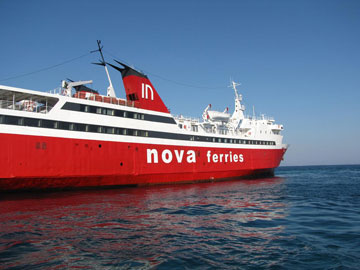 |
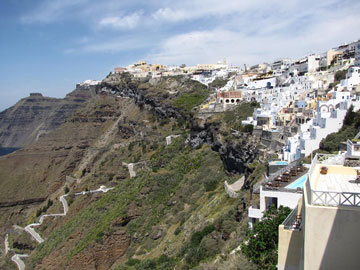 |
The ferry to Aegina |
A cable car ride up the caldera on Santorini |
WATER
BOTTLED DRINKING WATER IS WIDELY AVAILABLE AND INEXPENSIVE AND IS HIGHLY RECOMMENDED. The tap water in major cities is safe to drink. It is safe to brush your teeth in tap water, but to be on the safe side you may prefer to use bottled water.
It is very easy to get dehydrated, particularly as we will be walking around archaeological sites. ALWAYS DRINK PLENTY OF WATER. Bring a small water bottle with you into which you can decant some mineral water. It is useful, but not essential, to bring re-hydration salts in the event of sunstroke.
WHAT TO BUY - AND HOW MUCH MONEY SHOULD I TAKE?
There are very few real antiques for sale in Greece so beware of fakes. It may be better to buy one of the numerous good quality reproductions. Greece is famous for a number of products such as; replica artefacts, leather jackets and handbags, jewellery, and small souvenirs. In Greece there is a range of guidebooks available at the sites or in local bookshops. Remember to leave some space in your luggage for souvenirs.
The cost of the tour covers all accommodation and breakfast, transport to and entry to all archaeological sites and museums. Meals should cost about 11-15 euro for lunch and 18-30 euro for dinner. A general idea of expenses would be about A$30-60 per person per day for the meals and miscellaneous expenses such as water, fruit, chocolates, coffee will be additional. The cost of living has increased dramatically since Greece joined the EU and adopted the euro - expenses have also increased through the increase in VAT. Prices depend on where you are, and whether you stay clear of tourist traps.
Depending on what you want to buy, a good estimate for total expenses is an additional A$1500 per person.
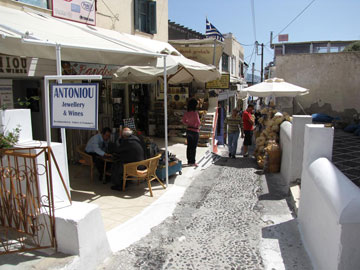 |
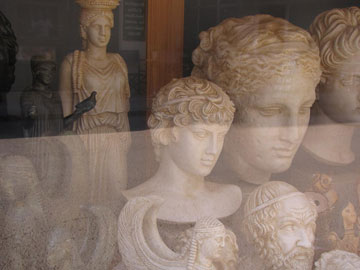 |
Shopping in Thera |
Tourist shops in Delphi |
WHAT TO TAKE - SOME SUGGESTIONS
A light small day-pack that you can carry every day to sites
Camera and spare batteries for your camera
Additional flash cards for a digital camera
Film - it is better to bring your own and is likely to be cheaper
A hat, sunscreen and sunglasses, a small bottle for drinking water
Sensible walking shoes with flat soles
Small torch and batteries for exploring the sites
A converter for electrical appliances - �European style� with two round prongs (or a universal adaptor)
Moisturiser cream and your familiar toiletries
Pharmaceuticals such as Panadol, throat lozenges and Lomotil
Universal plug for the sink/bath (not always provided)
A towel (just as a back-up - towels are always provided)
Washing line and pegs
Shampoo and soap, bandaids, �Wet-ones� or tissues
A mobile phone if you think this is necessary - you will need �global roaming� but remember that this is very expensive
Penknife, if desired, for cutting fruit etc. Always pack it in your main luggage, not your hand luggage, when flying - otherwise it may be confiscated at the airport security.
A few small padlocks to secure your suitcases. Keep the keys in two different places in case one set gets lost.
Remember - due to increased security requirements it is no longer possible to take more than 100ml of liquid in your hand luggage, and all liquids must be placed in a see-through plastic bag for airport checks. Larger quantities of liquids can be packed in your main luggage.
FINAL NOTE
The success of your holiday depends to a large extent on your individual approach. It is important to remember that you are a guest in another country. Remember, fellow travellers on the tour are drawn from many walks of life and a tolerant attitude can increase your enjoyment of the holiday. I am sure you will have a rewarding and enjoyable time!
Michael Birrell
